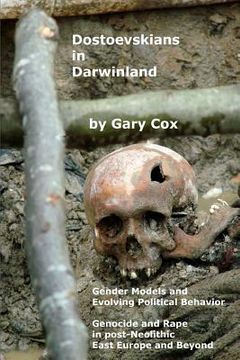Compartir
dostoevskians in darwinland (en Inglés)
Gary Cox
(Autor)
·
Createspace Independent Publishing Platform
· Tapa Blanda
dostoevskians in darwinland (en Inglés) - Cox, Gary
17,49 €
18,41 €
Ahorras: 0,92 €
Elige la lista en la que quieres agregar tu producto o crea una nueva lista
✓ Producto agregado correctamente a la lista de deseos.
Ir a Mis Listas
Origen: Estados Unidos
(Costos de importación incluídos en el precio)
Se enviará desde nuestra bodega entre el
Jueves 13 de Junio y el
Martes 02 de Julio.
Lo recibirás en cualquier lugar de España entre 1 y 5 días hábiles luego del envío.
Reseña del libro "dostoevskians in darwinland (en Inglés)"
The "Tyrant-Victim" dyad, put forward by Gary Cox three decades ago, was acclaimed as a key to understanding Dostoevsky's novels. Now Cox uses the concept to ask, and answer, telling questions about the evolution of Slavic culture, language, and politics. What is the link between patriarchy as a kinship system and patriarchal political culture? What role was played by sexual violence and policies of extermination as this link evolved? Was the moral landscape of east Europe in the age of migrations, when Slavic culture and language were taking trhe shape they have today, anything like the scene of the Yugoslav conflict of the 1990s? How did the interplay between herders and farmers in east Europe between 500 before-the-common-era (BC) and 500 Common Era (a.k.a. AD) impact the evolution of proto-Slavic culture? Was authoritarian political culture the inevitable result? Why did the Indo-European word-root 'pater' (Lat., "father") disappear from Slavic languages, replaced by a derivative from the word for 'uncle'? The classic Slavic folktale (and not only Slavic) relates the hero's departure from a troubled homeland and his conquests and marriage in foreign lands. Is this a pretty adventure or a mythic reframing of what was originally invasion and conquest rape? These questions are explored in the context of evolutionary psychology (forgive me, Fyodor Mikhailovich!), which can reveal startling new insights in materials that have been taken for granted. Why Dostoevsky? How is the "tyrant-victim dyad" reflected in great works of Russian literature, as well as in political culture and everyday life? Finally, what's the "take-away" from all this, in terms of everyday people in authoritarian cultures? How does it affect their sense of the effectiveness of their own political behavior?
- 0% (0)
- 0% (0)
- 0% (0)
- 0% (0)
- 0% (0)
Todos los libros de nuestro catálogo son Originales.
El libro está escrito en Inglés.
La encuadernación de esta edición es Tapa Blanda.
✓ Producto agregado correctamente al carro, Ir a Pagar.

